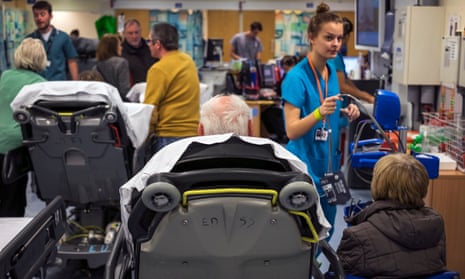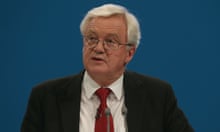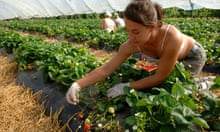The British economy needs a net inward migration flow of 200,000 people a year, double the Conservative target, if it is to avoid the “catastrophic economic consequences” linked to Brexit, a study by an employer-backed thinktank has said.
The Global Future report says the UK’s low productivity, ageing population and shortage of labour in key areas, such as the NHS, show that net migration of 200,000 will be needed annually.
The report, backed by three employer groups, criticises Labour and the Conservatives for refusing to be honest with the British public about the level of migration the UK requires. It warns that if the UK refuses to be flexible about its sources of labour, it could face a decade of slow growth similar to that of the Japanese economy.
The Conservatives recommitted themselves to a target of limiting net migration to tens of thousands in their manifesto on Thursday, promising to double the cost to an employer of hiring a skilled worker from overseas.
The net migration target recommended by Global Future is broadly in line with actual levels from 2000 onwards.
The figure, covering both EU and non-EU migration, is based on macroeconomic analysis and a bottom-up, sector-by-sector examination of existing labour shortages.
The report argues the labour market crisis is likely to become acute in the short term unless ministers give an early signal in the Brexit talks on the UK’s plans for EU residents and immigration.
The report says that even with a later retirement age, Britain faces a demographic time bomb, and needs migration of 130,000 a year to maintain the working population at its current level.
“The dependency ratio – the number of people of working age (16-64) versus those over 65 – is worsening. Between 1950 and 2015 this fell from 5.5 to 3.5. Only the recent increase in net migration has prevented it from falling even more precipitously,” it says.
“Between 2000 and 2050, the number of people over 65 will double, whilst the number of over-85s will quadruple. The working population would need to double in order to maintain the ratio at its current level.”
The report points out that the government’s own forecasting body, the Office of Budget Responsibility, has suggested migration is critical to reducing the fiscal impact of an ageing population. The OBR had suggested “spending on pensions, healthcare and social care means that in the absence of migration, debt as a percentage of GDP would increase from 75% in 2012 to 175% by 2057”.
The report also predicts the demand for skilled labour across social care, construction and nursing alone will require an extra 47,000 migrant workers a year, higher than the current migration of skilled, predominantly EU workers across all sectors.
In unskilled industries, such as hospitality, the industry will remain heavily dependent on migration, with the report predicting a continuing requirement for an extra 60,000 migrants a year.
Global Future points out that 22,000 of the 115,000-strong permanent workforce in agriculture come from the EU, supplemented by 60,000 seasonal workers. In food processing, 120,000 of the 400,000-strong workforce are from the EU.
Overall, it suggests, UK industry will need at least 100,000 work-related migrants a year with the remainder likely to be students and people coming to the UK for family reasons.
Gurnek Bains, Global Future’s founder and chief executive, said: “In this general election political leaders have failed to challenge the assumption that less immigration would be good for Britain. It might help particular politicians win elections but voters and our national interests will be the losers. There are now political leaders from across the political spectrum who either pretend lower immigration will solve every problem or connive in this deceit. These politicians are not only selling voters short – they are selling our country short too.”
Global Future has Mike Couple, the chief executive of Sainsburys, the Labour peer Spencer Livermore, and Evelyn Bourke, the chief executive of Bupa, on its advisory board.
The Brexit secretary, David Davis, suggested on Friday that the economy and public services were dependent on getting a good deal from the negotiations to leave the European Union.
Speaking on ITV’s Good Morning Britain, Davis played down the prospects of walking away from the negotiations if a good deal was not on offer, as Theresa May has threatened. But he also let slip how much was resting on securing a favourable outcome.
“My aim and my expectation is that we are going to get a free trade agreement, we are going to get a decent agreement with them,” he said. “And that’s the foundation. We get that, then you get the economy right, then you can pay for public services. That’s the way it works.”
His words suggest a possible willingness to compromise with Brussels after the EU’s chief Brexit negotiator, Michel Barnier, voiced his concerns that the refusal of member states to soften their demands over the size of Britain’s “divorce bill” could lead to a collapse in talks.










